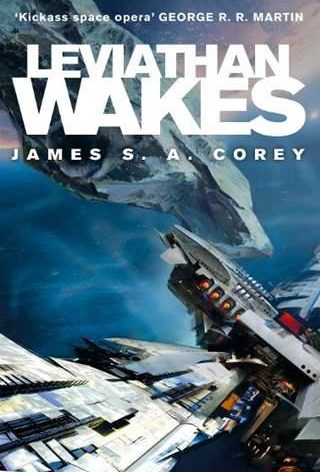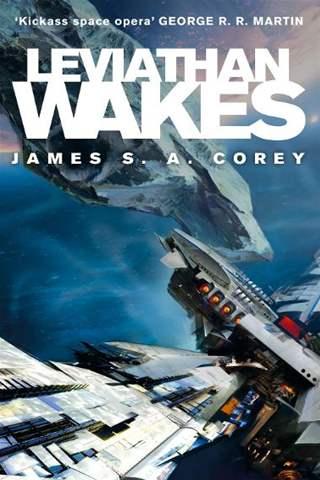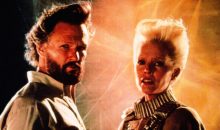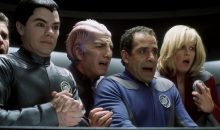The Expanse Series
My theory is that Daniel Abraham is the international man of mystery behind several of our most popular speculative fiction writers. He’s published so many novels & short stories, under so many different pseudonyms, that it is difficult to guess where the man ends and the myth begins. It’s likely that the man known as “Joe Abercrombie” is actually a well-paid stunt double accepting plaudits on Mr. Abraham’s behalf, and as for Scott Lynch, he’s probably a cleverly programmed robot. R. Scott Bakker? Complicated hologram. It’s all Daniel Abraham. Connect the dots, sheeple!
Ironic, then, that among the books we can conclusively prove that Mr. Abraham has written are a couple that he didn’t write on his own. The two current books in the Expanse series (and eventually the third) are the product of a collaboration between Abraham and one Ty Franck, who in other days works as George RR Martin’s personal assistant, accounting the details of his vast multimedia empire. By their powers combined they are James S.A. Corey, and so, through that complicated sequence of events, were produced Leviathan Wakes and Caliban’s War, two books by the entity known as James S.A. Corey, upon which I will now expound.
I’ve never been one for hard sci-fi; my favorites in the genre are the likes of Firefly or Dan Simmons’ Hyperion books, where the technological advancements take a backseat to the plot and the world-building focuses on how humanity is affected by this big brave new future, as opposed to the tools & tricks they use to make their way. Space opera, in other words; big, grand stories owing as much to Flash Gordon as to the works of Asimov. Expanse fits quite nicely into that broad niche, perhaps due to the authors’ joint backgrounds in fantasy. It’s a good title for a series; above all else, these books are broad in scope, ambitious in goals, sweeping between planets and disposing of moons with ease when the story demands it.
At the outset of Leviathan Wakes, two workaday gentlemen are just trying to get by in a solar system rife with all the politics you might expect from a human civilization with a hundred times the territory to fight over. One of them, James Holden, is a good-natured freighter officer making an honest buck traversing the space between worlds; the other, Joseph Miller, is a private detective working in a a security force on the end of civilization, whose atrophied moral capacity is propped up by a mostly-useless professionalism. Immediately, their respective predictable lives are shook up by events: Holden’s freighter is blown all to hell by an unmarked military vessel that he & his fellow survivors would love to identify, and Miller is sort-of hired to track down a fantastically wealthy man’s daughter. (Or more just adopts the job of his own regard. Joe Miller’s not a well man.)
In true space opera fashion, the personal quests of these two protagonists and their friends (well, Holden’s friends; Miller doesn’t really have any friends) take place against a spectacular backdrop of solar system-wide political struggle. Expanse takes place far enough in the future that we’re starting to see physiological differences between humans; “Belters” like Miller, born & bred in the colonized asteroids & moons of the outer rim, look almost freakishly tall and spindly to natives of Earth-standard gravity and atmosphere. It’s an important touch that underscores the tension between planets & nations without hitting you over the head with it; maybe people aren’t asking the question “Are they really human?” yet, but they’re about to.
Leviathan takes a screaming right turn into horror about midway through, as Holden’s quest for truth and justice and Miller’s ever-more-desperate search for a missing woman collide in the midst of a colony about to answer the big question underwriting every outer-space work there’s ever been: “Who else is out there?” The answer is a compelling sort of “Yes, but…” that managed to both intrigue me and send me screaming away from the dark corners of the universe. Before humanity can answer the question, they have to understand it, and understanding is going to be difficult.
Holden, described by half of his author as “a space paladin,” is a solid narrator whose occasional juggling of the Idiot Ball is justified by the text, but it’s his counterpart, Miller, who really gives Leviathan a jolt. Miller’s an old-school noir detective, porkpie hat and all, picked up and dropped into a future of space cruisers and asteroid mining; his low-rent thuggishness and whiskey-soaked desperation make him a sympathetic character always teetering on the edge of disaster. Ty Franck wrote Holden, and Daniel Abraham wrote Miller, but they gave each other’s work enough edits & reworkings that the book maintains coherence. The ending is a bit of a pile-on, with disaster following disaster as if the authors were daring each other to escalate the tension just a bit further, but the eventual conclusion is definitely satisfying.
Caliban’s War follows it up with a slightly different tone; more Firefly than Star Wars, I guess, with a good deal of the action following the adventures of Holden’s surviving crew and their new ship. For a few reasons, Miller’s involvement in the sequel is a bit limited, so narrative duties are split among a gung-ho Martian marine, a United Nations political operative, and a severely out-of-his-depth biologist. Like Holden, all of these characters are effective in their own way, but don’t have quite Miller’s unique blend of effectiveness and sheer fuckery. The best of them, the UN under-secretary, is the foul-mouthed Chrisjen Avasarala, who breaks up the monotony of defanging warmongering admirals and browbeating heads of state by moonlighting as a doting grandmother. She’s a hoot, especially when viewed from other perspective.
There’s a bit of repetition in Caliban’s War, with the meta-plot of humanity’s interaction with the mysterious powers uncovered in Leviathan Wakes; there’s also a point where Holden comes to a life-changing conclusion and makes a disastrous decision that comes off as somewhat forced and unbelievable. It’s still a strong book, buoyed by a great supporting cast and propulsive action scenes that are apparently largely the work of Ty Franck; the ending is also a little stronger than Leviathan, with less escalation syndrome but an equally impressive ending note.
Both books are distinguished by well-placed touches of humanity amongst the squabbling chaos and empty void. Meng, the biologist of Caliban, is driven by an all-consuming and occasionally suicidal need to find his missing daughter; Holden’s mad righteousness is only challenged by his growing closeness to his crew; Miller’s desperate search for the missing Julie Mao is just as much a search for his own fading connection to the people around him, people he sees more and more as walking lists of undiscovered crimes and hidden sins. And so on. It’s where the “romance” aspect of a space opera comes in; the idea that a few fading candles can make a difference against the vast indifference of the unknowable. It’s true, except when it isn’t.
I heartily, heartily recommend these books if you’re at all into Cool Stuff Happening In Space. The two-headed Corey entity said in an interview that above and beyond any important morals they want to convey (and I think there are some), they wanted to write a damn good story that could eat up hours of your brain functions. That’s what Expanse does, more than anything else; gives you something to read and a little more something to think about when you’re done. The third book, Abaddon’s Gate, is due out in May, so you’ve got some time to catch up.








Like I said before, if Kim Stanley Robinson’s Mars Trilogy and The Moon is a Harsh Mistress had a literary love-child, this would be it. One of the best sf books I’ve read in a very long time.